"When you see an insect lying on the ground, do you stop to consider it a fool? The life of an insect is so beneath you that it would be a waste of your time to even consider judging it. That would be an accurate summation of my feelings towards you humans."- Father
- This article is about the character. For the episode, see Episode 28: Father (2009 series).
Homunculus (referred to as "Father" (お父様, Otō-sama) by his "children", the other homunculi) is the central antagonist of the Fullmetal Alchemist manga and 2009 anime series. He is the oldest Homunculus and the progenitor of the Homunculi, creating them directly or indirectly. Arrogant and self-righteous, he deems only power over and ownership of the world, "perfect goodness and being", and "divine order" worthy of his attention, and he seeks to become absolutely "superior" to the human race. One of his outward looks bears a striking resemblance to Van Hohenheim.
"Father" was created from the essence of the Eye (with some of Hohenheim's blood mixed in), and thus Father's shadowy actual form greatly resembles the Eye. "Father" inherited much knowledge from the Eye, and, when it comes to amount, only those of the Eye and Truth exceed his knowledge.
Personality
Father's original personality when he was known as the Dwarf in the Flask is more human-like and beautifully charismatic than when compared to his later self. His later self is stated by Hohenheim to be much more stoic and lifeless, the reason being that he had supposedly purged himself of the seven vices (this "purging" seems to have been incomplete, since he acts in sinful manners that reflect the seven vices). He is dark and foreboding. During his first meeting with the Elric brothers and Ling Yao, Father shows a somewhat comical, lighter side to his personality, similar to that of Hohenheim, but almost immediately after switches back to his very serious demeanor.
Father is also cold, pitiless and believes that everyone around him are nothing but tools to be used as part of his plans. The only exceptions to this may be his seven Homunculi "children", as Hohenheim had stated during their battle that one of the reasons he had created them was because he wanted a family of his own, hence his title of Father. The Homunculi personalities vicariously reveal more about Father, since, as he tells Greed himself, they were born out of his own vices, as well as the subconscious emotions that drove them, and everything they feel he has felt himself. This is particularly true of Greed, Envy, and Pride. Greed's desire for possessions was really an attempt to escape the loneliness and desire for close friends he felt deep down, whilst Envy's grandiose hatred of humans covered up a deep-seated inferiority complex and envy of humans, particularly their sense of emotional intimacy, and Pride's great disdain of the human race covers a certain lack of self-reverence. These revelations suggest that deep down, part of what Father wanted to purge was his own unbearable loneliness and jealousy that humans had each other for social, emotional, and physical support whilst he was originally the only Homunculus on Earth. Since he could not be like or part of the human race, and since he feels done with the sickening social deprivation he suffered through for what he felt was too long a time, he resolved to break free of the flask that prevented him from having physical contact with people, and to shun all the "burdensome" feelings he previously desired- longing for experiencing intimate physical and familial companionship with other people- as "inferior" by going for what he deems infinitely greater- the power to chaotically abolish the physical laws imposed upon everything.
His thirst for power seems to be the only thing more important to him other than himself, noted when he does not hesitate to abandon his Homunculus "son" Pride in exchange for resupplying his Philosopher's Stone or to absorb Greed into his body to resupply it. Also, though he considers the Homunculi to be his children, he never expressed grief for any of their demises. Unlike Lust or Envy, Father has also stated that he feels no hatred or contempt towards humans. He confesses to Edward that he merely sees humans as nothing more than stepping stones for himself, explaining his outright indifference towards them.
Despite his normally calm, brooding personality, he is shown to be extremely excited when his plans finally come together, showing a wicked, gleefully evil side to his personality, as he was giggling with delight as the nationwide transmutation circle took affect. When outside of his human container and revealing his true form, he is often seen with a wicked grin.
Father claims that Truth (the consciences of alchemists) is a personal God, and since Father considers himself perfectly good, he also thinks that God is on his side. Father's extremely personal interpretations of Truth's works have a logical flaw, according to Edward Elric.
Back when he had his original, mortal form in the flask, he had a much more charismatic personality to him. "Full of human emotions", as Hohenheim notes, before he "purged" out his cardinal sins. When confronted by Hohenheim about this, Father reveals that the seven Homunculi were only created so he would become a perfect being. Ultimately, in his final moments, Father's motivation is revealed to be freedom from the laws of the universe itself.
Appearance and Abilities
First Appearance
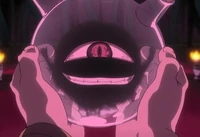
Father's original form, inside the flask.
Father's first form is a small round mass of black gas with a single eye, a wide toothy mouth, and tendril-like arms, making him resemble the Eye of Truth from inside the Gate (This might be because Father was created from the entity's essence). He wasn't able to perform alchemy while inside the flask, but was able to teach it to the people of Xerxes.
Second Appearance
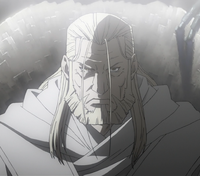
Father's second form.
Due to his limitation of Hohenheim's body in Xerxes, Father's second form looks identical in appearance to Hohenheim, excluding hair and skin color, hairstyle, clothing, a few additional wrinkles, and a lack of glasses. Hohenheim has referred to this form as nothing more than a human-like husk that Father uses to hide his true appearance. He is normally seen in the cavity beneath Central in which he and the Homunculi reside, sitting on a stone or cement throne with numerous pipes leading to it. The throne itself also has a physical connection to him, which can be unattached from him via pipes directly protruding from his spine. He uses the pipes to spread the Philosopher's Stone beneath the nation of Amestris. The purpose behind this is to act as a barrier between the tectonic energy of the earth's crust, where Amestrian Alchemy gets its energy from, so that he can stop others from using Alchemy at any time. Doing this, however, has aged his body slightly more than Van Hohenheim, who still looks identical from the time of Xerxes. This process, however, can be countered by a "Reverse Transmutation Circle" , which is a concept Scar's brother had figured out by combining Xingese Alkahestry and Alchemy practices. Alkahestry was unaffected by Father's barrier because Alkahestry uses energy from the Earth's chi instead, which allows Scar and Mei Chang to continue using their alchemy even when Father blocks Amestrian Alchemy.
Father's body is created by and contains the Philosopher's Stone that came from half of the souls of the human population of Xerxes (however, he later gave parts of it to create the other Homunculi). Due to this, he is able to perform alchemy without drawing a transmutation circle, clapping his hands together, or even moving at all.
Third Appearance
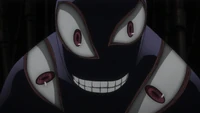
Father's true form revealed.
During his battle with Hohenheim, Hohenheim gains the upper hand in the battle. However, after Father casts aside his "second form" husk and reveals his true form, an unseen battle takes place between him and Hohenheim resulting in Father's victory. In this form Father is shown to have a strange, almost liquid-like body structure somewhat resembling his ancient flask form. He is able to use alchemy to reshape his own body for any situation. The most common shape he took was that of a slightly obese humanoid with eyes with red irises adorning his black body and a wide grin on his otherwise nonexistent face.
It would later be revealed to actually be an aspect of a giant cyclopean being that reveals himself once obtaining the souls of Amestris and begins absorbing the entity beyond the gate, though Father cryptically revealed it to discourage his sacrifices from escaping. This form is much thinner, showing what looks like a rib cage, a more muscular body, the multitude of eyes and wide grins that were on his previous form are gone, and he now has one large, bulging eye on his forehead.
Fourth Appearance
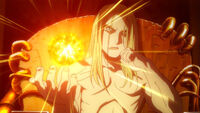
Father's fourth form, containing a "miniature sun within his hand".
Father's fourth and final form looks much like a younger version of Hohenheim. Also, despite looking so young, he keeps the voice of his second form. Due to the sacrifices, Father managed to absorb the entity beyond the gate and now has the "power of God" within him with the Amestrian souls he absorbed keeping it in check. He can now almost completely defy natural order (or, in Father's words, "do anything"). He can manipulate energy and matter to their full extent, turn anything into anything at any scale and create any force at any magnitude.
He retains his fourth form and the powers that go with it even after having lost the Amestrians' souls, but as he lacks the strength to keep "God" inside his new body, the new power is too much of a strain on him, and as of chapter 107, it renders him vulnerable to counterattack. Reflecting this, Father's appearance deteriorates as the fight goes on: his skin and hair losing their color, pronounced veins appearing across his body, and eventually his face losing almost all human resemblance.
Chapter 106 also revealed that Father now has the ability to create bodies for the souls inside his Philosopher's stone. However, in the manga, these beings are not well-made and start to fall apart moments after they were created. Father used this ability to distract his enemies so he could unleash a devastating attack.
Part in the Story
While it is never fully explored, the being that would later call itself Father was originally a part of the existence within the Gate. Using the blood of his slave Number 23, the Alchemist to the King of Xerxes managed to contain a small portion of the knowledge and life of the Gate within a flask, capable of existing in the physical realm. Named simply "Dwarf in the Flask" or "Homunculus" by the people of Xerxes, this sentient creature contained a vast amount of knowledge, the most important and influential being the skills that would become standard alchemy.
The Dwarf in the Flask was unable to perform any alchemy of his own. Furthermore, though the flask was the only thing that keeps him alive, Homunculus desired to exist outside it. To that end, he befriended Slave 23 out of similar circumstances as slaves to their respective plights, in turn naming the lad Van Hohenheim and educating him to win his freedom as act of thanks for his hand in creating him.
However, Homunculus grew envious of the human race, jealous of their mutual emotional support for each other whilst he grew lonely, being only one of his kind. Losing sight of his own unique, supreme, and special gifts and talents, Homunculus lost much of his self-confidence, and this low self-esteem caused him to fill himself up with hubris and a desire to become a being superior to even God himself.
Years later, the King of Xerxes (who, like Father, has become vain and hubristic) finally revealed the use for Homunculus; he wanted to call upon him to give the secrets of immortality. Homunculus used this opportunity and instructed the king to construct a giant transmutation circle out of the kingdom, creating bloodshed at specific nodes of the circle. He then manipulated the event so he and Hohenheim were standing at the true center of the circle, so once it was activated, every soul in Xerxes besides himself and Hohenheim were sacrificed to make what was possibly the first Philosopher's Stone ever created.
Homunculus used this power to open the Gate of Truth and created new, immortal bodies for himself and Hohenheim, living embodiments of the Philosopher's Stone with the hundreds of thousands of souls of Xerxes split between them as their power. Horrified at his role as an unwilling partner in this horrific act, Hohenheim parted ways with Homunculus.
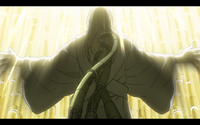
Amestrian alchemy's source of power.
After the destruction of Xerxes, Homunculus made his way to find another inhabited place. Finding such a patch of land, he took the small group of people thriving there and taught them alchemy, becoming known as the "Philosopher of the East". However, to ensure his teachings would not be used against him, he placed himself under what would become Central Command and used himself as a buffer against tectonic energy so alchemists would actually use energy derived from the souls of Xerxes contained within himself. At some point he began using those same souls to create his Homunculi offspring and accordingly started going by the name "Father".
From this point, the people formed the powerful military state of Amestris, a puppet government secretly run by Father. Amestris begins to rise in power and annexes all nearby land, eventually branching out to form yet another giant transmutation circle, with all skirmishes and bloodshed involving the Amestrian military taking place at the important nodes of the circle. While Father's scheme was to repeat his actions at Xerxes to create another Philosopher's Stone, he now requires an eclipse to become a "perfect being", ("the sun symbolizes a man, and the moon symbolizes a woman, when they come together they become a perfect being" -Edward Elric) and five alchemists that had opened the Gate as human sacrifices.
Throughout the first half of the story, Father is mostly seen sitting on a stone throne with many pipes leading into it. He is properly introduced when Wrath captures Greed and brings him to Father's underground lair. After his offer to the Homunculus was turned down, Father had Greed boiled in a tub of liquid which decomposes his body into his core Philosopher's Stone. The Stone, now in a liquid state and containing Greed's soul, is then consumed by Father.
Father's full identity is revealed when Gluttony brings Alphonse into the Homunculi's lair, prior to Gluttony's body tearing apart as Envy, Edward and Ling Yao emerge from Gluttony's stomach. When the Elrics recognize his face, Father admits his amazement that Edward and Alphonse are Hohenheim's children, before healing Edward's wounds and restoring Alphonse's missing arm. Having no use for Ling, however, Father orders Gluttony and Envy to kill him. Edward pleads for him to spare Ling, but Father makes it clear that he does not care for anyone not a part of his plan. Edward and Alphonse use their alchemy to attack Father, with no avail; Father is entirely unharmed by their attacks before he merely stomps his foot to seal off all alchemy in Central.
However, entering Father's lair at the same moment, Scar and May Chang astonish Father with their own counterattacks, unaffected by his alchemic lock-out with their own unique forms of alchemy. However, even pointblank, Scar's alchemy is unable to harm Father. Scar and May are overwhelmed while Envy captures the Elrics. Meanwhile, Father too easily defeats Ling and then takes the liquefied stone, in which Greed is contained, and merges it with Ling, stating that he could have use for another pawn after all. Ling then becomes the new Greed and Father has the Elrics taken to the surface before tending to the injured Gluttony. From there on, Father is mostly seen sitting on his throne, musing over his plan and conversing with the military high command.
The Promised Day
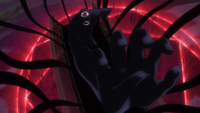
Father prepares to swallow "God".
When the Promised Day begins, Edward, Hohenheim, Scar, Lan Fan and the chimera invaded his lair with plans to kill him for good by destroying his shell.[1] However, only Hohenheim manages to reach him as the two do battle. But when it seems Father has won when he manages to stab Hohenheim, he learns all too late that Hohenheim managed to work with the souls within his Philosopher's Stone, some of which destroy his shell from the inside. Unfortunately, Father reveals to Hohenheim how far he has evolved since they parted ways, emerging from his shell and eating it with the Philosopher's Stones it still contained, before restarting the fight. He defeats Hohenheim, restraining him with his body and later greets Izumi and the Elric brothers, who didn't recognize him at first. Soon after, Pride arrives with a blinded Colonel Mustang, giving Father his fifth and final human sacrifice.
Despite the alchemists' refusal to aid him, and Greed's attempt on his life, Father defeats his attackers and proceeds to finally activate the Nationwide Transmutation Circle around Amestris, using the restrained sacrifices' gates to access the Earth's gate while absorbing all of the Amestrians' souls. From there, in his full form, Father tears open the Gate of Truth with his bare hands; absorbing the higher power he calls "God". Once the transmutation process is completed, in a new youthful body, Father states to the alchemists how he "imprisoned God" within his body and possesses all the knowledge and power of "God". No longer needing sacrifices, Father cancels Alchemy once more and prepares to dispose of the five sacrifices, as well as Greed and May, at his whim.
Final Battle and Defeat
However, Hohenheim reveals his own plan: all the Xersesians souls that Hohenheim separated from his body and merged with the earth itself force Father to release the Amestrian souls and guide them back to their own bodies. Without the Amestrian souls, Father begins to lose control of "God" as he attacks the group with formidable blasts of explosions, that Hohenheim manages to block. Luckily, Scar activates the Alkahestric reverse-Nationwide Transmutation Circle, which nullifies Father's "buffer" and grants true alchemy to Amestrians. Knowing that fighting the alchemists would only further weaken his ability to contain "God" within him, Father takes to the surface of Central Command to claim the souls of the nearby Briggs soldiers and replenish his stone, but an attack from Hohenheim makes him lose concentration. Now surrounded by Hohenheim, Izumi, Alphonse, and May, Father is asked by Hohenheim the reason why he hates humans by pointing out his origins. But intrigued by Hohenheim telling him all he does is destroy, Father proves him wrong by resurrecting the Xerxesians with his body. This horrific act would be used by Father as a distraction to catch everyone off guard so he can release a devastating attack. However, Ed arrives and snaps everyone out of this while Father fires an explosive blast, wiping out both the recreated Xerxesians and most of Central Command. However, Al and Hohenheim managed to shield everyone at great expanse to their physical beings before the military joins the fray with the blind Mustang, along with Lt. Riza Hawkeye supporting him, and Major Alex Louis Armstrong spearheading the attack. Eventually, though attempting to absorb Greed to replenish his stone, the fight begins to take its toll on Father after he destroys Ed's automail arm with relative ease.
A large surge of energy explodes from Father, sending everyone around him flying. Father begins to lose control of his God as a result of using up too much of his stone energy to defend himself. Father then turns to a pinned Ed, and desperately moves to take Fullmetal's soul to replenish his stone supply. Ed, however, is saved by Al, who uses May's help to sacrifice himself in exchange for the return of Ed's original right arm. A distraught Edward calls Alphonse an idiot before releasing himself from his pinned state and beginning a furious barrage of attacks against Father, greatly depleting Father's stone.
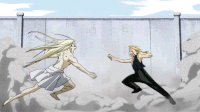
A confrontation between two individuals born from the same man.
On the verge of defeat and reeling in shock at being bested by a mere human, Father dashes at Greed to claim his Philosopher's Stone from Ling's body. However, Greed takes this opportunity to start destroying Father's body, using his power of carbonization to turn Father's body into the weakest form of carbon - graphite. Enraged that his own son would rebel against him to the end, Father destroys Greed's soul. However, ensuring Greed's death was not in vain, Edward uses this opportunity to punch a hole though Father's chest, through which the remaining Xerxesian Souls of his Philosopher's Stone escape. With no power left to contain "God" or to sustain his physical existence, Father is horrified as "God" emerges from his body and grabs him. Father laments the harshness of reality, crying out that he does not understand why reality does not permit him to get his greatest desires, and why freedom seems so impossible to achieve; soon his body disintegrates.
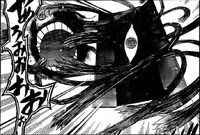
Father is finally banished to whence he came.
Father, now in his original form, appears before the Gate and asks God why he was not accepted as its vessel, and gets a reply: "It's because you did not believe in yourself." When Father searches for the origin of the voice, encountering the Truth, yet unaware of Truth's identity as it berates Father for trying to take the power of someone greater than him. Father claims that he wanted all the knowledge in the world and that he wanted to know what God knew. He then goes on to ask what was wrong with wanting, wishing and chasing your desires, showing the humanity he tried to purge himself of. Truth mocks him, saying that taking the power of God didn't make him God, but rather a cunning thief. Demanding to know who he is speaking to, Father is horrified when Truth formally introduces itself and states itself as the Truth as he defines it: giving despair to discourage one from becoming boastful and proud. Truth tells Father that he'll receive his most fitting despair as the Gates open up and hands appear to grab Father. Father begins crying as he desperately asks what he did wrong to deserve this and where he went wrong, showing the flaws he tried to purge himself of. Ultimately, stripped of the freedom he cherished, Father is sucked into the Gate and once again becomes part of the endless abyss within.
Trivia
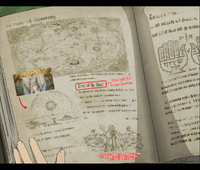
Father makes a brief cameo in episode 2, when Edward is reading a book about the Philosopher's Stone.
- Father's original flask-bound form was most likely inspired by real life concepts of Homunculi. Supposedly, if an alchemist was successful in creating such a being, he was to keep it inside of a glass flask for a certain period of time, as it would die in its "infancy" stage outside of it. Father's evolved multi-eyed and multi-mouthed form and its giant incarnation could be a play on the "Homunculus argument" fallacy.
- Father and Envy from the 2003 anime share several similarities, as both have some sort of previous affiliation with Hohenheim, being created by him. The two were considered the first Homunculi in their respective storylines, being approximately 400 years old. It is also interesting to note that Pride's original form resembles Father's fourth form, with both looking like younger versions of Hohenheim.
- Though it's stated numerous times that Father has expelled all of his sins, it's interesting to note he acts in a way similar to that of the sins: He desires for becoming a perfect being (Lust); devours souls with no self-control (Gluttony); seeks power at all costs (Greed); prefers to let others do his bidding for him while being incredibly incompetent and doing little to nothing to further his own goals over hundreds of years (Sloth); feels anger towards any opposition, principally Hohenheim (Wrath); has a desire for a family like humans (Envy); views humans as "ants" (Pride). However, given the general vagueness of these behaviors, as well as his dispassionate demeanor compared to both prior to the creation of and after the death of the homunculi, seems to imply that he did get himself purged of his sins.
- Indeed, the process of rejecting his sins is hinted by the Truth to be the reason for his malevolence.
- He's told Greed that anything he wanted was desired by him first, meaning that Greed's desire for friends was something Father desired but expelled because he thought it was weakness.
- His largely prideful-seeming nature may be a reference to pride being the "father of all sins", though it's easy to argue that his biggest sin is sloth rather than pride.
- Despite desperate for souls to replenish his Philosopher's Stone when the Amestrians souls were taken from him, Father completely ignores Pride (who had both the Philosopher's Stones of Gluttony and Kimblee within him along with his own.) It's possible he spared Pride to buy him time to escape.
- When Father succeeded in opening the Gate, he emerged from the ground in a much larger form of himself. This massive form of Father is exactly the same as his previous form yet his body is slightly altered. He is much thinner, showing what looks like a rib cage, a more muscular body, the multitude of eyes and wide grins that were on his previous form are gone, and he now has one large, bulging eye on his forehead.
- Father's image bears a striking resemblance with the image concept of God as an old man with robes in multiple religions. Ironically, the nature and symbolism of his origin, methods, and goals actually makes him the closest analogue the Fullmetal Alchemist franchise has to Satan. Dr. Tim Marcoh referring to the Philosopher's Stone as "the Devil's research" is found to hint at this when it turns out that Father is responsible for the first stones ever created and seeks to achieve "godhood" by further powering his own stone with souls.
- Father's voice actor in both the Japanese and English version also narrates the 2009 anime. They can be heard previewing the next episode and at the beginning of the first few episodes where they briefly explain the concept of alchemy to the viewers.
- Father's English voice actor also voiced Majhal from the 2003 anime.
- In the 2009 anime, before Father gets sucked back to the Gate (while in his fourth appearancce), he loses both of his arms (the other arm was lost when he destroyed Greed), unlike in the manga where he only loses one arm and one leg, ironically mirroring what happened to Ed at the beginning of the story.
- Father is the character with the greatest amount of changes in terms of increasing his own capacities, due to his numerous transformations.
- In the original Japanese version of Brotherhood, when Father is in his "old man" form, he sounds like he's struggling to pronounce certain words, and talks at a very slow pace, when he's in his original form, he speaks much more fluently.
- Truth's ultimate punishment for Father seems poetic:by letting the Eye of God drag him back into the Eye, they let Father become as high as God in some senses whilst stripping Father completely of the freedom he cherished.
- In the manga, Father's eyes in his fourth form are dark purple and, like those of Envy, Lust and Greed, have slit pupils. In the 2009 anime, they are golden with round pupils like Edward's, possibly to further imitate Hohenheim's appearance. Also, Father's fourth appearance wears sandals in the manga whereas in the anime he appears barefoot.
- Before meeting the Elric brothers for the first time, Father and Hohenheim's actions are coordinated very specifically to match up in the manga, leaving it ambiguous if he and Hohenheim are indeed the same person. Despite basing itself wholly on the manga, the 2009 anime does not include any of these scenes.
- When Father is sucked back into the Gate, it could almost be seen as comical that such a tiny creature was responsible for the entire plot of the story.
- Since each of the Homunculi he created were partially made of his soul in an attempt to cleanse himself of his sins, a part of him is still alive due to Pride never being fully destroyed.
- This could possibly hint that Father may be able to possibly be reborn or recreated through Pride. Though because he was banished back into the Gate from where he originated, it is unclear if this could actually happen.
- The Gate that Father appears in front of is completely blank.
- This could possibly signify that a Homunculus can't use alchemy normally.
- Considering the gate seems to portray a different alchemic symbol (such as Mustang's transmutation circle) between alchemists, it may also be seen to represent Father's status as a being originating from the gate itself.
- This could also signify Father, as the Truth stated that Father "stole his powers from others", and thus never had any real power of his own.
- The gate could also represent what they had learned, as truth stated that Father "stole his power from others", this might imply that since Father only stole and never learned anything, his Gate was blank.
References
|
| Homunculus |
|---|
| Father |
| Lust | Gluttony | Greed | Sloth | Wrath | Envy | Pride |
| 2003 Anime Exclusive |
| Wrath | Sloth | Pride |
